“It Should Never Happen Again”
Use controls above or click here to open this Hometown Heroes podcast in a new window
92-year-old Robert Uyesaka of Clovis, CA appears on episode #563 of Hometown Heroes, airing February 14-17, 2019. Uyesaka, born in California but raised in Arizona’s Salt River Valley, served in the 442nd Regimental Combat Team during World War II.
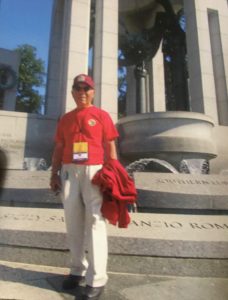
Robert Uyesaka at the National World War II Memorial, during his trip with Central Valley Honor Flight.
“Save what you could,” he says of his farming family’s mentality during the Great Depression. “And utilize what you have.”
As immigrants from Japan, his parents were excluded from owning land, but Robert and his three older siblings helped out around the 80-acre farm they leased. Amid the fields of strawberries, cantaloupes, and other produce, Uyesaka dreamed of someday pursuing a medical career.
“I always wanted to become a doctor,” you’ll hear him recall, adding that he had even taken classes in preparation for that vocation. “But then when Pearl Harbor happened, and we were taken into camps and everything, all that went out the window.”
He didn’t hear about the Japanese attack on Pearl Harbor until the evening of December 7, 1941. The family had been out in the fields, preparing for harvest, and learned of the shocking news on the radio upon returning home. The changing atmosphere was evident the following day when he went to school, and on February 19, 1942, President Franklin D. Roosevelt issued Executive Order 9066, which would usher in a reality that the teenager could have never imagined.
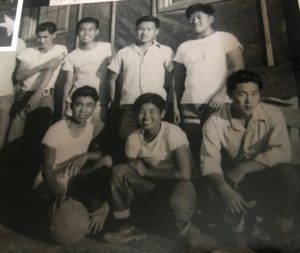
Robert (front row, left) and other young people saw sports as an important outlet during their time behind barbed wire.
Within a month, his father had been hauled off by the FBI and detained in Montana. Soon, the rest of the family would be forced to abandon the farm, leaving behind unharvested crops, and evacuate to what had been a Civilian Conservation Corps camp in Mayer, AZ. Later, they were moved to a larger camp in Poston, AZ. Just 16 years old when he was forced behind barbed wire, Uyesaka found an important pastime, a valuable outlet, in playing football, basketball, baseball, and softball with other internees.
“Without the sports and everything,” you’ll hear him explain. “Life in camp would have been real dull.”
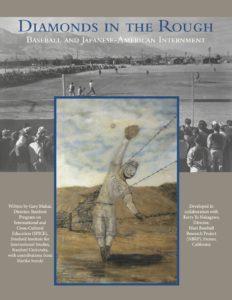
Diamonds in the Rough is a curriculum guide detailing baseball behind barbed wire during the Japanese internment.
Kerry Yo Nakagawa of the Nisei Baseball Research Project has produced a study guide and accompanying documentary outlining the role that baseball played for a young second baseman like Robert Uyesaka and so many other Japanese-Americans during the internment. In addition to that Diamonds in the Rough curriculum, Nakagawa has also published the book Through a Diamond: 100 Years of Japanese American Baseball. Listen to Hometown Heroes for more of Uyesaka’s experiences behind barbed wire, including what he remembers as the most difficult elements of those uncertain times. At one point, his father was brought into their camp in Poston for medical treatment, but his mother, limited by arthritis, was unable to secure transportation to the hospital. Robert didn’t meet the age requirement for visitors, but he found away to communicate anyway.
“I had to stay outside his window and talk to him through an open window,” you’ll hear him remember. “He became well, but since he came from a different camp, they wouldn’t release him.
Listen to the program to hear what steps Robert had to go through to arrange for his parents to be reunited and join his older brother in Colorado. All the family members would eventually see each other again, but the last time they were ever together as a family of six was the day his father was carried away by the FBI in March, 1942.
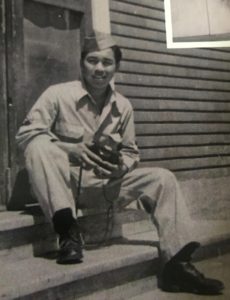
Robert Uyesaka after being drafted into the Army. For more photos, visit the Hometown Heroes facebook page.
After leaving the camp, Robert marked his 18th birthday, and was subsequently drafted. The same United States government that once classified Japanese-Americans as “enemy aliens” and ruled them unfit for military service, was now calling him to serve.
“You can’t forsake your country,” he remembers his father telling him and his siblings in the wake of the attack on Pearl Harbor. He endured discrimination and harassment during his training in Camp Shelby, MS, but eventually headed overseas to join the 442nd Regimental Combat Team in Europe. By the time he arrived, Germany had surrendered. After some time in occupation duty, he returned to the U.S., eventually raising four children with his wife of 66 years, Jo. He tends to downplay his own contributions, but takes pride in the collective efforts of Nisei veterans in World War II.
“I think we did prove something,” Uyesaka says. “I’m not sure if everybody’s aware of it.”
One method of maintaining awareness is the annual Day of Remembrance, marked by Japanese-American organizations to mark the anniversary of Executive Order 9066.
“This Day of Remembrance is to let the world know that it should never happen again,” you’ll hear Robert explain. “It’s just not right that people were subjected to such trauma.”
Uyesaka has imagined how different a financial position his family might have ended up in if they had never been forcibly removed from their farm. He knows his siblings, citizens by birth, were almost old enough to purchase the land. He’s aware of how successful Japanese-American farmers just beyond the zone where relocation was required eventually became. But none of that redirects his focus from things for which he’s grateful.
“Everything’s turned out for the better, through the hardships and all that,” he says. “If we had stayed in Arizona, I wouldn’t have met my wife, I wouldn’t have my children, and I wouldn’t be here today either.”

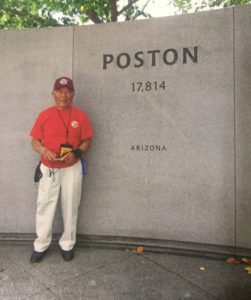



Thank you for the story Mr. Loeffler. I had the great honor of meeting Mr. Uyesaka today, while he was fishing. Once I heard a small part of his story, I sat in the sand and spoke to him for quite some time. I wanted to know how he felt about the things that had happened to him and the things that are going on in the world today. He is a fascinating man with a heart full of love and forgiveness. I count myself very blessed to have been led to this wonderful man. I’m grateful to you for filling in some of the details that I missed or misunderstood today. It’s a wonderful article, and I love the title. It should NEVER happen again. Thank you for sharing this wonderful man’s story.
Pingback: Hometown Heroes Radio » New Documentary Spotlights Nisei Veterans